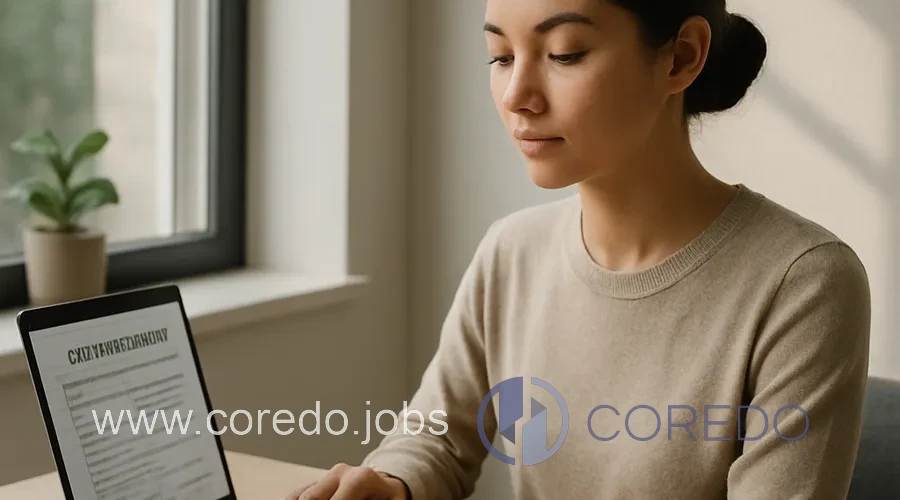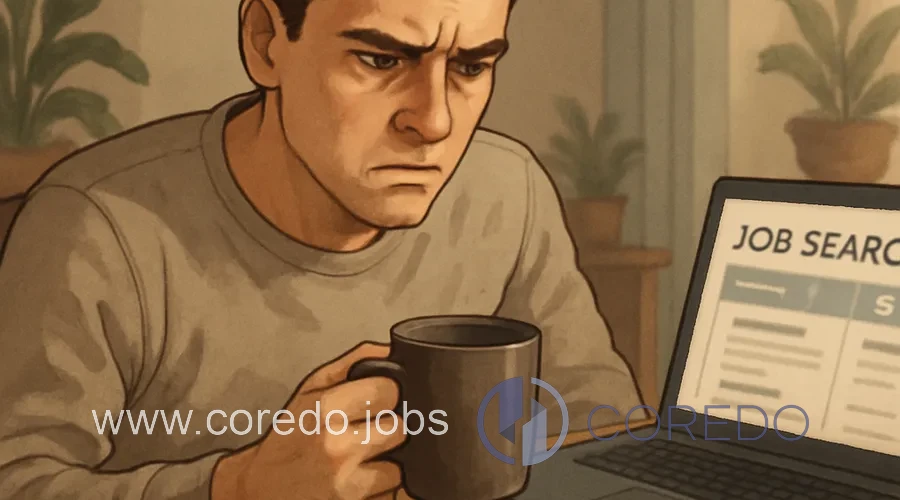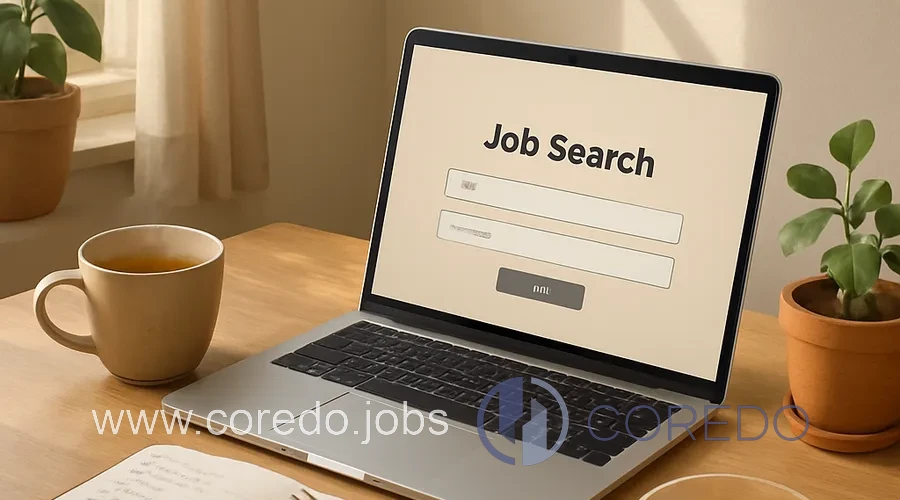Did you know that up to 85 % of job applicants experience significant stress during the job search, which can affect not only their mental health but also long-term career growth? According to global studies, work-related anxiety and stress during job hunting have become one of the main reasons for declines in productivity and motivation during periods of professional change. So how can you manage stress when looking for a job so that it does not limit your decision-making, efficiency, or personal well-being?
Stress during the job search: how will it affect your career?

Stress during the job search can significantly affect not only an individual’s psyche but also their future career direction. Understanding how pressure in the labor market impacts mental health and job performance is key to successfully coping with this challenging period. The following sections will focus on the links between stress related to job hunting and its impacts on mental health and career.
Stress in the job market and mental health
Stress during job hunting is today a common experience across industries and positions. From COREDO.jobs practice I know that the main stress factors in the job market include:
- Uncertainty about the future – rapid changes in the economy, digitalization and automation create pressure to be adaptable.
- Bureaucratic obstacles – especially for foreign applicants, where it is necessary to handle visa processes and legalization of residence.
- Competitive environment – managers and specialists often face high demands regarding qualifications and experience.
- Psychosocial risks – long-term unemployment increases the risk of anxiety, depression and negatively affects the immune system.
At COREDO.jobs we have repeatedly observed that correctly identifying stress factors is the first step to managing the whole situation.
The impact of stress on job hunting
Our observations show that stress and work-related anxiety significantly affect the effectiveness of job searching. Applicants under pressure often:
- React impulsively to unsuitable offers.
- Tend to underestimate their own abilities.
- Make mistakes in documentation, which can lead to rejection.
Managers who are seeking new employment may, as a result of stress, lose the ability to strategically plan next steps. Research shows that stress negatively affects cognitive functions, reduces decision quality and increases the risk of mistakes in key situations.
How chronic stress affects your career
Long-term stress during the job search has not only an immediate impact on psychological well-being but can also affect future career growth. Experts at COREDO.jobs report that chronic stress often leads to:
- Reduced motivation and loss of interest in the field.
- The development of burnout syndrome, which complicates returning to the work process.
- Weakening of social ties and isolation.
Symptoms of stress during job hunting

Job hunting is often associated with a high stress load that can affect not only your mood but also overall health. Symptoms of stress during the job search can manifest in various ways – from psychological difficulties to physical problems. Below we look at the most common symptoms of stress that may arise during this time.
Symptoms of stress – mental and physical
Stress during job hunting manifests in different ways – from mild nervousness to serious psychological and physical difficulties. From our experience at COREDO.jobs it is appropriate to pay attention to the following symptoms:
- Psychological symptoms: anxiety, irritability, insomnia, loss of motivation, difficulty concentrating.
- Physical symptoms: headaches, increased blood pressure, digestive problems, weakened immunity.
Sleep quality plays a crucial role in resilience to stress. Applicants who neglect sleep have a higher risk of fatigue and mistakes in decision-making.
Preventing burnout during the job search
Typical manifestations include:
- Chronic fatigue and a feeling of hopelessness.
- Loss of meaning and interest in the field.
- Reduced ability to enjoy successes.
Prevention of burnout involves regular rest, alternating activities and timely seeking of support. At COREDO.jobs we recommend that applicants include relaxation techniques in their daily routine and devote time to personal development.
The next part will focus on a detailed analysis of the symptoms of burnout syndrome and its impact on the mind and body.
How to manage stress during a job search

Job hunting can be demanding not only in terms of time but also psychologically, and often brings stress and uncertainty. At such times it is important to know how to manage stress during the job search and to use mindfulness and psychological techniques that help maintain calm and self-confidence.
Mindfulness and psychological techniques for applicants
Modern psychological methods for managing stress during job hunting include:
- Cognitive-behavioral techniques – help recognize and change negative thinking patterns.
- Mindfulness – consciously focusing on the present moment reduces anxiety and increases emotional resilience.
- Relaxation – short meditation or breathing exercises effectively reduce tension.
From COREDO.jobs practice it has proven effective to recommend simple mindfulness techniques to applicants, such as conscious breathing or a short meditation before a job interview. These methods increase resilience to stress and help better cope with pressure.
How to manage stress using time management
Effective time management when job searching is one of the most effective ways to reduce stress and work-related anxiety. I recommend:
- Set realistic daily goals and tasks.
- Break the job search into smaller steps (e.g., CV update, interview preparation, networking).
- Regularly evaluate progress and adjust the plan according to the current situation.
For successfully managing the job search, it is crucial to implement a systematic approach to planning and regularly assessing your progress.
Now we’ll look at proven time-management techniques that will help you handle other related activities and maintain efficiency throughout the process.
{{next_header}}
How to use biofeedback and breathing techniques?
Biofeedback and breathing exercises (for example the Wim Hof method) are innovative ways to manage stress during the job search. They help:
- Consciously control physiological responses to stress.
- Reduce tension and improve concentration.
- Increase overall psychological resilience.
Experts at COREDO.jobs recommend including short relaxation blocks in your daily routine, which has proven effective even for managers in demanding fields such as engineering or financial services.
Coaching, mentoring and social support
Social support is one of the most important factors in coping with stress. Coaching and mentoring provide:
- An independent perspective on the situation and feedback.
- Help setting realistic goals and strategies.
- Support in overcoming setbacks.
COREDO.jobs’ experience confirms that applicants who use mentoring return to the job market faster and handle external pressure better.
How to manage interview stress

Interview stress is a common phenomenon that can affect your confidence and results. Learning how to manage interview stress will help you approach it calmly and confidently, which will significantly increase your chances of success. The text below provides concrete advice and techniques on how to do this.
How to handle stress during an interview
Stress and job interviews are often linked. From my experience I recommend:
- Careful preparation – knowledge of the company, the position and your own strengths.
- Practice answers to common questions and rehearse nonverbal communication.
- A short relaxation right before the interview (e.g., deep breathing).
The COREDO.jobs team uses mock interviews, which help candidates gain confidence and reduce job-related anxiety.
Psychological preparation in a crisis
Emotional intelligence is key to coping with interview stress. It is recommended to:
- Be aware of your own emotions and work with them.
- Actively listen and respond calmly to unexpected questions.
- Focus on solutions, not on the problem.
Experts at COREDO.jobs advise candidates to train emotional reactions through feedback from colleagues or a coach.
How to handle stress from rejection
Rejection is a natural part of the job search. Our case studies show that the key is:
- Perceive rejection as an opportunity to improve.
- Analyze feedback and adjust your strategy.
- Maintain a positive attitude and don’t give up after the first failure.
How to manage stress when job searching?

Job searching often brings increased levels of stress, which can negatively affect not only performance but also a person’s overall well-being. Therefore it is important to learn to effectively manage stress during the job search so that you don’t lose motivation and clarity during this demanding process. In the following sections we will focus, for example, on options for using stress-tracking apps that can help you better understand and manage your emotional reactions during this period.
Stress-tracking apps
Digital tools for tracking stress allow you to:
- Monitor stress levels in real time (e.g., using apps to measure heart rate or mood journals).
- Identify stress triggers and plan effective responses.
- Evaluate long-term trends and adapt stress-management strategies.
At COREDO.jobs we recommend using verified apps that are available in Czech and Ukrainian and respect data protection.
Stress analysis using AI and neural networks
Modern HR technologies, including neural networks and artificial intelligence, enable:
- Analysis of labor market trends and prediction of stressful periods.
- Personalization of support for individual candidates based on their profile.
- Automated recommendations of suitable job openings with regard to psychological well-being.
The solutions we implement at COREDO.jobs increase recruitment efficiency and reduce job-related anxiety for candidates and employers.
How to measure the ROI of stress-management programs
The ROI of stress-management programs can be evaluated using:
- Shortening the time to find a job.
- Reducing the number of mistakes in documentation and interviews.
- Increasing satisfaction and loyalty of newly hired employees.
From our projects in the financial services and pharmaceutical sectors it follows that investment in wellbeing programs yields measurable results not only for individuals but also for companies.
Work-life balance when job searching
Work-life balance during a job search is a key topic that helps align professional commitments with personal life so that mental and physical well-being are preserved. Setting clear boundaries between work and private life is essential to maintain this balance during the demanding process of looking for employment.
How to set boundaries between personal and work life
One of the most common mistakes when job searching is blurring the boundaries between work and personal life. I recommend:
- Set clear times for job searching and for rest.
- Spend time on hobbies and family, which help regenerate mental energy.
- Regularly assess your own satisfaction and adjust your routine as needed.
This strategy has proven effective for managers and specialists in various fields where the risk of burnout is high.
How flexible work affects stress
Flexible working conditions, for examplethe possibility of remote work or part-time employment significantly reduces stress especially for applicants with family obligations. At COREDO.jobs we have observed that companies offering flexibility have higher success in recruiting and retaining employees.
How to manage a digital detox?
Digital detox means the deliberate limitation of using digital devices. It helps to:
- Reduce information overload and anxiety.
- Improve sleep quality and concentration.
- Support creativity and innovation when looking for new opportunities.
At COREDO.jobs we recommend that applicants include regular offline blocks in their day that support mental health.
How to reduce stress when job-hunting as part of a team
Job searching in a team can be demanding and often brings increased stress, especially if it involves a shared goal or a competitive environment. The key to reducing it is effective communication – both in the workplace and in personal life.
How to communicate effectively at work and at home
Open and honest communication is key to coping with outside pressures. It is recommended to:
- Share your goals and expectations with those closest to you.
- Set clear boundaries and rules for discussions about job searching.
- Seek support from colleagues who have gone through a similar experience.
COREDO.jobs experience confirms that applicants with strong support from their surroundings handle stress better and return to the work process more quickly.
How to get social support
Social support includes not only family but also friends, mentors and professional Contacts. A strong support network:
- Reduces feelings of isolation and helplessness.
- Allows sharing experiences and gaining valuable advice.
- Strengthens resilience to stress and increases the chances of successfully finding a job.
Therefore, at COREDO.jobs we recommend actively building a professional network, for example through online platforms or professional groups.
How to measure the effectiveness of stress management when job searching
The effectiveness of stress management while job searching plays a key role not only in the process of adaptation itself, but also in coping with challenging situations and maintaining good mental fitness. To be able to effectively measure how well to face stress, it is important to understand not only the basic principles of stress management but also specific strategies for coping with stress in both work and team environments.
How to better manage stress at work and within a team
Effective stress management can be measured and scaled using specific metrics:
- Job search duration – shortening the process thanks to better strategies.
- Number of interviews attended without burnout – shows a candidate’s resilience.
- Satisfaction level and wellbeing score – regular self-assessment using digital tools.
COREDO.jobs experts recommend regularly evaluating these indicators and adjusting strategies according to current needs.
How to measure productivity and ROI
Measuring the impact of stress management on productivity and ROI includes:
- Increasing success in obtaining employment.
- Reducing turnover and increasing employee loyalty.
- Improving the overall atmosphere in the company and the personal well-being of applicants.
Conclusions from case studies in banking and construction confirm that systematic work with stress brings long-term benefits for companies and individuals.
From personal experience, I know that coping with stress while job searching requires a combination of psychological, organizational and technological approaches. The COREDO.jobs team is ready to share proven strategies and offer comprehensive support to everyone who wants to manage work-related anxiety and find stability in the Czech work environment.







